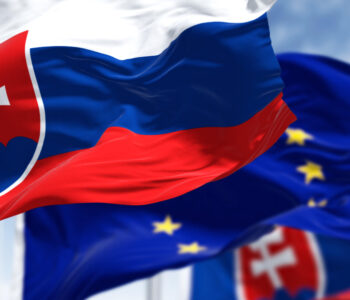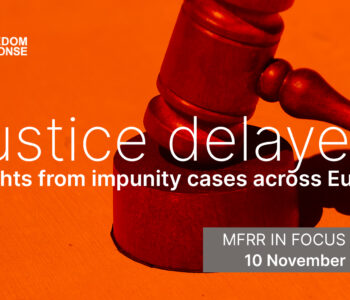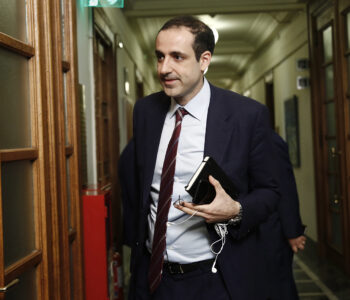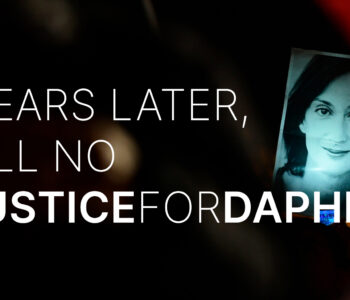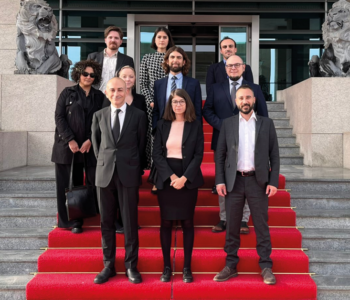In recent months Slovakia has passed important legislative changes which will ensure a better media environment and move the country closer to standards outlined by the recently published European Media Freedom Act (EMFA).
Moreover, in addition to the laws already passed, others are in preparation. If the full package is achieved, Slovakia can become a leading example of press freedom for other EU countries, such as Hungary or Poland, where press freedom continues to face major challenges from media capture.
In its program statement (2020-24), the current government promised a complex reform which would reflect modern changes in the media environment. The changes this reform introduces and proposes are revolutionary by Slovak standards.
The problem with previous Slovak media legislation was that it did not reflect the online environment, titled the scales in favour of political forces, and allowed ways for these forces to influence public media.
The motivation for the change is also public pressure for better protection of journalists after the brutal murder of journalist Ján Kuciak and his girlfriend Martina Kušnírová in 2018.
Reforms passed already
In August, the parliament passed a new Act on Media and the Act on Publications, replacing two outdated laws, the Press Act and the Compulsory Copies Act.
These new laws strengthen the protection of journalists, extend source protection to online media, and bring greater transparency to media ownership and funding, which strengthens their credibility against media disseminating disinformation.
Firstly, under the new Act on Media and Act on Publications, the right to protect the confidentiality of sources – which was in the past only guaranteed for broadcast and print media journalists – has been extended to include journalists from online media.
Secondly, media outlets must also declare any investor or donor who invests more than €2,000 per year. This change should make the media environment in Slovakia more transparent. A number of anonymous sources of disinformation, pro-Russian or politically motivated websites operating in Slovakia would have to declare their real “final beneficiaries” in a public register, which will allow anyone to verify whose is behind these outlets. For non-compliance with this obligation, media may receive a warning or a fine of up to €20,000.
Thirdly, the new law also strengthens the protection of minors, improves access to audio-visual content for the disabled by increasing quotas for multimodal access, and specifically promotes broadcasting for national minorities and ethnic groups in public service broadcasting.
It also regulates the conditions for television and radio, regardless of whether they broadcast standardly or online, and introduces several rights and obligations for television and radio. Every viewer will now be able to find out who owns a given medium and there will be a register where all the information will be available. This will be administered by the Ministry of Culture, which is to establish the register within 30 months of the adoption of the law.
In addition, the law redefines general rules for advertising in both public and private media and, in line with European requirements, introduces the notion of community periodicals into the Slovak legislation and allows for the application of self-regulatory mechanisms.
Last minute amendments from politicians
The downside of the new media laws, however, is that MPs in the last steps of finalising the legislation process introduced a “right to expression” for public officials into it, thus securing for themselves more media space than ordinary citizens. The right to expression for public officials was only included in the bill at the end of the second reading in parliament – as amendments by MPs from Sme rodina and OĽaNO.
“Politicians have their channels of communication. The most followed profiles on social networks belong to politicians, they express themselves in press conferences that are broadcast. So there is no reason for a politician to exercise his right to express himself in the exercise of his public office,” media lawyer Tomáš Kamenec told the daily SME.
In the original draft law, the right to expression could only be used to deny, supplement, clarify or explain factual allegations. Parliament eventually approved amendments that extended the right to expression to value judgments based (columns or opinion pieces) on disputed claims.
Alexej Fulmek from the Association of Print and Digital Media (ATDM) and CEO of the Petit Press publishing house considers the adoption of the “right to expression” as a step backwards. “Unfortunately, politicians in Slovakia are mostly under the impression that the media are causing harm to this country and that they are the ones who have to fight them. They don’t understand that the role of the media is to be critical, especially towards politicians. In this atmosphere the idea prevailed that politicians need some ‘stick’ against the media. This probably seemed to them as an adequate solution,” Fulmek told Strategie magazine.
Increasing protection for journalists
Additional planned changes deal with the protection of journalists. Draft amendments to the Criminal Code would remove the long-criticised prison sentence for defamation, which has been a major threat to journalists in Slovakia for years. Under the current law, defamation carries a prison sentence of two to eight years. Under the new legislation, defamation would not carry a prison sentence.
The planned amendment to the criminal code also introduces so-called “special motives” for crimes, which will include a crime committed against someone for exercising of their job, profession or function. This may contribute to better protection of journalists and other professions (doctors, teachers, security forces…) who face many threats and can face attacks in their work. A crime committed with a specific motive will carry higher penalty.
For now, the draft of this law remains parked at the ministry of culture. Questions remain over whether the government will find the political will to pass such legislation.
Further changes planned
The Ministry of Justice has also proposed amendments to extend the scope of the Freedom of Information Act. The amendment expands both the scope of information to be provided and the persons obliged to provide it. For example, the draft also extends the list of companies that are obliged to provide information to state-owned companies and second- and third-tier subsidiaries of state-owned companies, which are not covered by the current law.
The proposal also extends the mandatory disclosure of information to persons seeking public office as well as to public officials themselves. It also introduces an obligation to publish all amendments to contracts subject to mandatory publication.
The Ministry of Culture wants to implement the PersVeilig (Press Safe) platform for greater protection of journalists in Slovakia, following the example of the Netherlands.
In 2019, the PersVeilig platform was launched in the Netherlands to improve the safety of journalists. The platform was also created because although journalists faced threats, they often did not report them because they felt they were not sufficiently dealt with by the police. PersVeilig improves cooperation between journalists, their employers, the police and prosecutors.
The Slovak Ministry of Culture wants to work with the Netherlands to improve the protection of journalists domestically. “We are not talking about whether it should be an organisation, a platform, a technical or procedural solution. What we want is to reach a concrete result that can be implemented and traced,” said Radoslav Kutaš, the ministry’s state secretary, told Denník N.
If all these plans are indeed implemented, Slovakia will meet many of the requirements of the European Media Freedom Act regarding of the protection of media pluralism and independence, and in some respects may even go beyond them, such as the ambition to create a special platform to protect journalists.
Challenges remain
Despite many positive ambitions, the media environment in Slovakia continues to face problems. Journalists, especially those from the opinion-making media, are constantly targets of verbal attacks from politicians, mainly from former Prime Minister Igor Matovic, but also from the opposition.
For example, the deputy chairman of the opposition Smer party, Ľuboš Blaha, regularly dehumanises journalists. Matovič, who leads the biggest party in parliament, also regularly attacks journalists on his Facebook page and recently accused unspecified media of corruption, “spreading lies” and compared the work of Slovak journalists to Nazi propaganda.
In Slovakia, the problematic environment for independent public service media also remains a major issue. The main problem is that both the director and the supervisory boards of Slovak Radio and Television (RTVS) are elected in parliament after political agreements are made. Politicians still have influence over the funding of public service media. Changes need to be made to guarantee that public service media management and funding are more independent and more resistant to political pressures.
Even if the political will is there, the road ahead contains multiple pitfalls. The forthcoming changes may be stalled by the current unstable political situation that brings about the possibility of the fall of the current government and of early national parliamentary elections, which may result in a government of such parties that do not favour the idea of a free media.
However, if the planned changes are passed, Slovakia would take major steps forward in strengthening the legal frameworks for media freedom and provide a positive example to follow for other EU Members States in Central and Eastern Europe in the years to come.
 Event
Event


